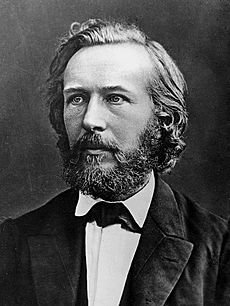List of ecologists facts for kids
An ecologist is a scientist who studies how living things, like plants and animals, interact with each other and with their surroundings. This includes everything from tiny bacteria to huge whales, and their environments like forests, oceans, or deserts. Ecologists try to understand how nature works, how different species depend on each other, and how human activities affect the planet. Their work helps us protect endangered species, manage natural resources, and keep our Earth healthy.
Contents
What is Ecology?
Ecology is the study of ecosystems. An ecosystem is a community of living things (like plants, animals, and fungi) and their non-living environment (like water, soil, and air) that work together. Ecologists look at how energy flows through these systems, how nutrients are recycled, and how populations of different species change over time. They also study how humans impact these natural systems, often leading to important discoveries about climate change, pollution, and habitat loss.
Pioneers of Ecology
Many brilliant scientists have helped us understand the natural world better. Here are a few notable ecologists who made big differences in how we see our planet.
Ernst Haeckel: Coining "Ecology"
Ernst Haeckel (1834–1919) was a German biologist and artist. He is famous for coining the word "ecology" in 1866. He combined two Greek words: oikos, meaning "house" or "habitat," and logia, meaning "study of." So, ecology literally means "the study of the house" – our Earth and its living systems. Haeckel was also a big supporter of Charles Darwin's ideas about evolution. He helped spread these ideas in Germany through his detailed drawings and writings.
Charles Darwin: Foundations of Interconnectedness
While not strictly an ecologist, Charles Darwin (1809–1882) laid much of the groundwork for ecology. His theory of natural selection, explained in his book On the Origin of Species, showed how living things adapt to their environments. This idea is central to ecology, as it explains how species interact with their surroundings and why certain traits help them survive. Darwin's work highlighted the deep connections between all forms of life and their habitats.
Rachel Carson: Protecting Our Planet
Rachel Carson (1907–1964) was an American marine biologist and conservationist. She wrote the groundbreaking book Silent Spring in 1962. This book warned the public about the dangers of pesticides, especially DDT, to wildlife and human health. Her powerful writing helped start the modern environmental movement. It led to new laws to protect the environment and a greater awareness of how chemicals can harm ecosystems. Carson's work showed how important it is to understand the impact of human actions on nature.
Aldo Leopold: The Land Ethic
Aldo Leopold (1887–1948) was an American forester, philosopher, and environmentalist. He is best known for his book A Sand County Almanac, published after his death. Leopold introduced the idea of a "land ethic," which means treating the land and its resources with respect, not just as something to be used. He believed that humans are part of the natural community, not separate from it. His ideas greatly influenced the conservation movement and how we think about protecting wilderness.
Eugene Odum: Ecosystem Ecology
Eugene Odum (1913–2002) was an American ecologist often called the "father of modern ecology." He and his brother, Howard T. Odum, pioneered the study of ecosystems as whole units. They looked at how energy flows through food webs and how nutrients cycle within an ecosystem. Their work helped define ecology as a distinct scientific field. It also showed how complex and interconnected natural systems truly are.
Why Ecologists Matter Today
Ecologists are more important than ever in our world. They help us understand big challenges like climate change, deforestation, and pollution. They study how these problems affect plants, animals, and even us. By researching and sharing their knowledge, ecologists guide us in making better decisions to protect our planet for future generations. They work to find solutions for a healthier and more sustainable Earth.
Images for kids
See also
- List of climate scientists
- List of women climate scientists and activists
 | Selma Burke |
 | Pauline Powell Burns |
 | Frederick J. Brown |
 | Robert Blackburn |






